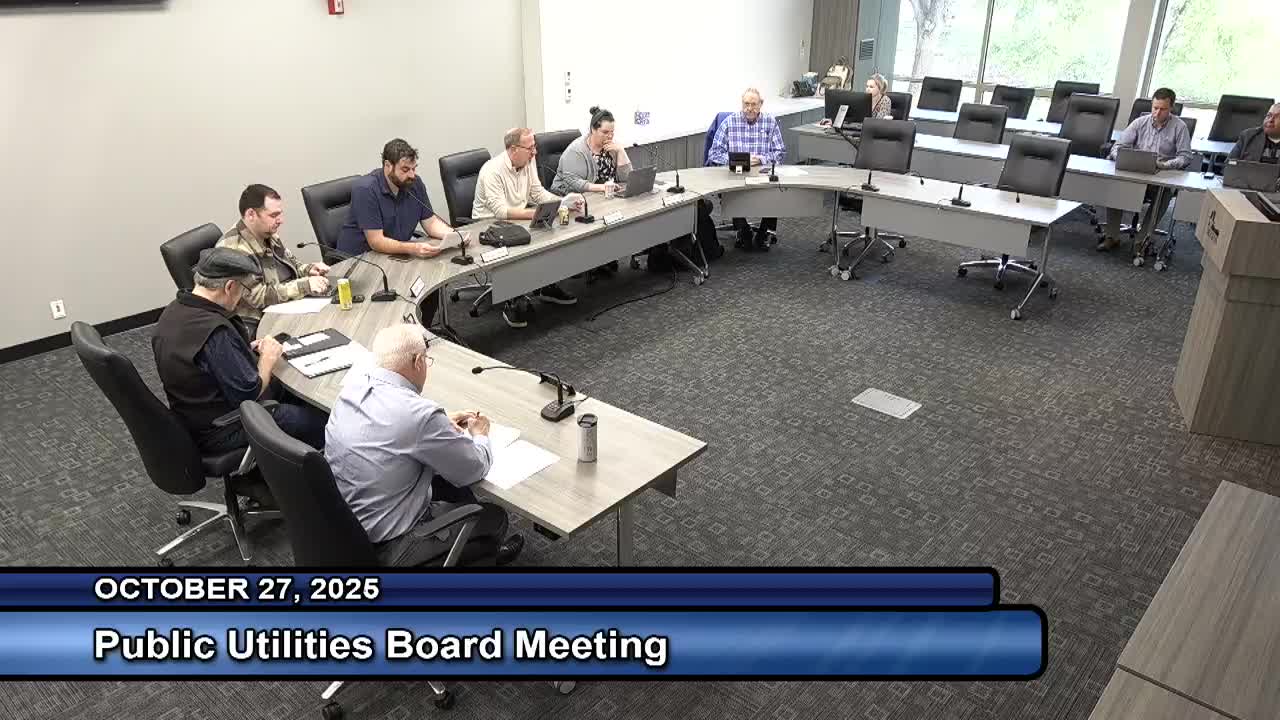Denton Public Utility Board approves contract with Acceleron for prepaid utility service
Get AI-powered insights, summaries, and transcripts
Subscribe
Summary
The City of Denton Public Utility Board voted unanimously Oct. 27, 2025, to recommend an ordinance authorizing a contract with Acceleron Software to provide a prepaid utility platform, authorizing a not-to-exceed amount of $15,460,605.23 and a 3-year initial term with up to ten 1-year renewals.
The City of Denton Public Utility Board voted unanimously Oct. 27 to recommend adoption of an ordinance authorizing a contract with Acceleron Software to provide the utility’s prepaid billing platform. The board’s action authorized a not-to-exceed amount of $15,460,605.23 for the contract and described the agreement as a three-year initial term with ten one-year renewal options extending the potential term through September 2038.
The board’s customer-service manager, Krista Foster, told the board the prepaid program was launched in October 2018 and that technical reviews had initially expected a 10-year lifecycle but later recommended a 20-year lifecycle for the product. Foster said the platform gives residential customers daily usage and cost information, reduces large final bills and arrears, does not require deposits, and charges no late or interruption fees. “We introduced prepaid utilities in October 2018,” Foster said, and later told the board that a “20 year, life cycle option was more appropriate for this product.”
The nut graf: The contract approval supports a program city staff say helps customers avoid large overdue balances and service interruptions by letting customers prepay and monitor usage in near real time. Board members pressed staff on the projected cost, the scale of potential enrollment, fee structure and contract terms before the unanimous vote.
Board discussion and staff explanations
Foster and other staff described how the system works for residential electric customers with advanced metering: balances are reduced as customers use service and daily usage monitoring allows customers to plan deposits like refilling a prepaid cellphone or a gas tank. Foster said usage monitoring is provided at no charge; the city pays enrollment fees per enrolled meter and may incur per-message charges for certain alert deliveries. On fees she said the city’s materials modeled enrollment fees and message costs but did not provide an exact per-message rate in the meeting: staff said per-message costs “would incur a charge,” and characterized the enrollment fee as a monthly per-user charge (one board member estimated “something like $10 a month per enrolled meter,” which staff said would be lower but did not confirm on the record).
Foster described a built-in debt-recovery option: customers who carry arrears can place funds in a prepaid account, and payments are applied to outstanding balances as they make payments. Foster said in the event of interruption the account-holder must pay the negative balance and that when debt payments are applied a customer receives a $25 service credit and services are restored within 15 minutes.
Staff also described the financial projection used to set the contract ceiling. The city’s model assumed a 5% annual increase in total customers and capped the prepaid program at 15% of the utility’s customer base for long‑term projections. Foster said the $15,460,605.23 figure reflects projected expenditures over the modeled period under those assumptions; she emphasized the city would only pay for services actually used and would not transfer unused budget to the vendor.
Board concerns and contract terms
Board members voiced concern about the headline not-to-exceed number and the contract escalation mechanics. Foster said the recommended contract includes language allowing the vendor to request an annual price increase, and the city included up to an 8% annual escalation in its projection. One board member said the projected total “makes me leery” because it implies large escalation over the life of the contract, while another member noted the projection is a planning ceiling rather than a guaranteed payment to the vendor.
Laurie Huel, the city’s purchasing manager, addressed termination language. Huel said she would confirm whether the Acceleron contract includes the city’s usual 30-day termination-for-convenience clause, explaining: “Our basic contract, we put a 30 day to terminate for cause or for convenience. So, hopefully, the convenience is in this 1 also. I can get back to you to make sure Okay. That it's in there.”
A board member asked for the origin of the 15% cap and Foster said the number was based on observed enrollment and plausible uptake: the utility currently serves about 81,000 customers and has roughly 2,100 enrolled in prepaid service (about 2.6% of customers); staff used conservative growth assumptions to avoid under-budgeting if enrollment increases.
Formal action and related votes
The board voted unanimously to recommend adoption of the ordinance authorizing the contract with Acceleron Software, with the contract described as a three-year initial term and up to ten one-year renewals for a total not-to-exceed amount of $15,460,605.23. Earlier in the meeting the board also approved the consent agenda and the Oct. 13, 2025 minutes; both motions passed unanimously.
Management reports and documentation follow-up
During management reports a board member raised concerns about an improperly prepared utility-relocation memo. Aaron Skinner, senior project manager for capital projects, responded, “I take full ownership. It was a mistake. It was an oversight,” and said staff would perform additional dry runs and due diligence before submitting future documents.
Votes at a glance
- Consent agenda: approved (unanimous) — motion from board member Robert; second from board member Taylor (as stated during the meeting). - Approval of minutes (Oct. 13, 2025): approved unanimously. - Recommend adoption of ordinance to award contract to Acceleron Software for prepaid utility solution: approved unanimously; contract described as three-year initial term with ten one-year renewals, not to exceed $15,460,605.23.
What’s next
Staff will confirm contract termination language and return any clarified procurement language to the board as needed. No additional action items were scheduled on the board’s meeting packet.
